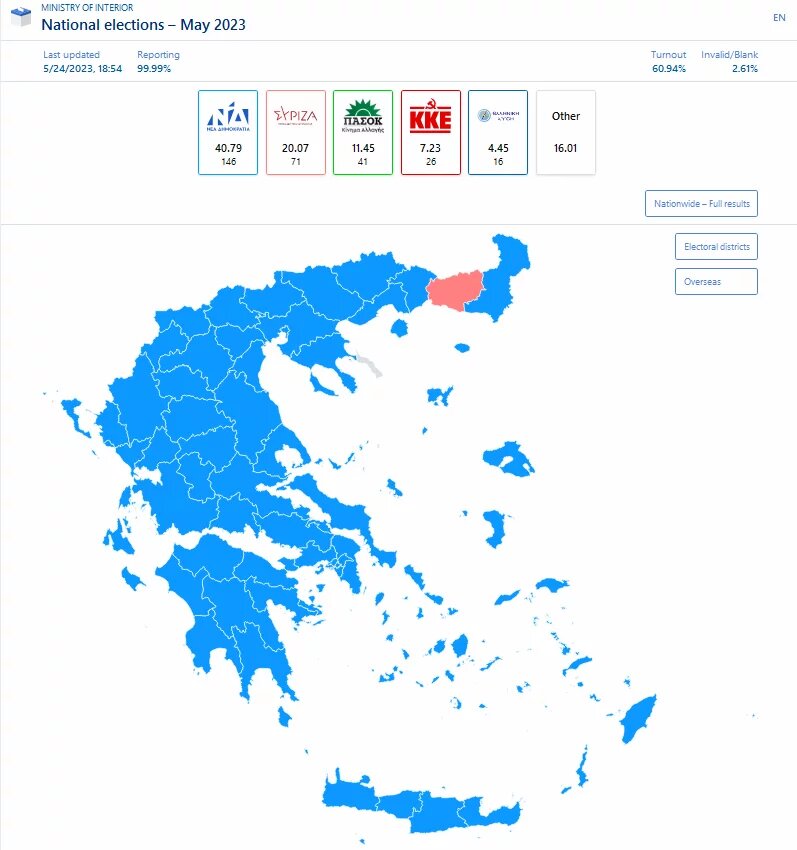
The national elections of May 21st led to a historic victory of the conservative Nea Dimokratia, seem to have reshuffled the political landscape in the country, yet Greece is set for a second election in a month time. Michalis Goudis, Director of the Heinrich Böll Foundation, Thessaloniki Office - Greece, provides a read of the election result.

A triumph but no government
The national election of May 21st 2023 will be engraved in the electoral history of Greece as a rather significant chapter given the fact that this has been the clearest triumph any party has ever succeeded in the modern history of the country after the military dictatorship, the so called “Metapolitefsi” time (1974). This has also been the first time a ruling party has managed to increase its popularity. The conservative Nea Dimokratia (ND) and its leader Kiriakos Mitsotakis were actually surprised by their own success that secured them 40,79% of the popular vote, leaving the opposition party of left-wing SYRIZA almost 21% behind at 20,07%. Yet, Greece is again getting ready for another election round most probably on June 25th, as the formation of a government was not possible.
According to the electoral system of the simple proportional representation, under which this election took place, one party can get the absolute majority only if they get a percentage close to 50%. As ND had clearly indicated in its campaign that its goal is to build a government by itself, calling for “more stability”, read the election result as a mandate to run a second election - that will be held under a different electoral system, that of enhanced proportional representation[1] - that will allow it to secure the absolute majority. This is why Kiriakos Mitsotakis returned the exploratory mandate to form a government to the Greek President, Katerina Sakellaropoulou on the same day. The Greek Constitution foresees that three exploratory mandates are handed over to the first three parties of each election to form a government. The leader of SYRIZA, Alexis Tsipras did not try to use it either, accepting his clear defeat, despite the fact that during his campaign he’s been the only one calling for a “progressive coalition government”. Finally, Nikos Androulakis of the socialist PASOK also returned the mandate to the President. The deadlock shall now be resolved in second national election.
Despite the fact that the prevailing public discourse through the main Media outlets and especially by the representatives of ND argues that another visit to the polls is reasonable after such a result, one cannot but wonder whether the voters share this view. The turnout in this election has been just below 61%, higher than 2019, and nobody can be certain that this number will remain the same at an election that is scheduled when Greek summer (with thousands of seasonal employees) will be in full swing. The political landscape in Greece has traditionally been characterized by the dominance of two major parties (either ND and PASOK or ND and SYRIZA over the last decade), a reality that pushed for governments of absolute majority. Coalition governments have been an exception and were a de facto solution either at times of political turbulence (1989) or during the financial crisis.
As the electoral campaign was rather quiet and definitely poor in terms of content, the public debate in Greece did not revolve around the big questions of our time, such as the Climate Crisis, economic inequalities, AI etc., but was rather self-referential focusing on issues that one party could blame another for. This strategy, served by all parties of the political spectrum, did not cultivate the ground for a wider understanding on a number of issues that go beyond the one-party agenda. If one follows the public debate on mainstream media in Greece, it is evident that stability equals one party with a strong absolute majority. And all this while the country has come out of a long financial crisis that was followed by the pandemic and the consequences of the war in Ukraine that de facto led to some level of collaboration among parties, if one looks at the bills passed.
A reshuffle in the political landscape?
Many commentators in Greece claim that this has been the end of the political cycle of the Crisis, a time during which SYRIZA emerged as the main opposition party and PASOK practically evaporated. On Sunday, May 21st SYRIZA saw its popularity drop from 31,53% in summer of 2019 to just over 20%. At the same time, PASOK managed to secure again double digits after many failed consecutive efforts since 2012. Could this be the first step towards a bigger shift in the opposition spectrum? The ballot of June 25th will be an indicator. In any case, SYRIZA is now confronted with internal questions ranging from analysis of mistakes in electoral strategy all the way to even the leadership issue. PASOK seems to be gaining momentum, presenting itself as a more “systemic” opposition compared to SYRIZA, encouraged by the fact that it managed to surpass SYRIZA in six electoral prefectures, securing overall 220.000 additional votes compared to four years ago.
With ND being the undisputed winner of the election, securing 53 out of 54 electoral prefectures, and even in population groups that have not traditionally been its strongest point, such as the fact that ND came first in the age group 17-24 with 31,5% vs. 28,8% of SYRIZA, the challenge for the opposition as a whole is significant. And this is also a central question for democracy overall in Greece in the coming years. Can a meaningful and relevant opposition emerge out of the May 21st results anytime soon? This remains to be seen.
As the ties between parties and voters become looser and looser compared to the past, nobody can be certain how the results of the second election will like or even what the outcome of the Local and Regional Elections due in October will be. 16% of all the ballots cast last Sunday was given to parties that did not make it over the 3% threshold for parliamentary representation. This is the second highest result ever. How will these voters express themselves in a few weeks? How many parties will indeed be represented in the Greek Parliament? Under the packaging of certainty illustrated in the results, many questions arise for the future of Greece. What is a fact is that the far right seems to be gaining ground, if one takes into account not just the votes of “Elliniki Lisi” (4,6%) but also the votes for newly shaped parties, like “Niki” that nearly made it to the 3% threshold. This is a factor of the overall political equation that must not stay under the radar.
[1] Under this system, the first party will receive a 20-seat bonus if it gets more than 25 percent of the vote. This bonus will increase with the party’s percentage of the vote, up to a maximum of 50 bonus seats for parties that get 40 percent.